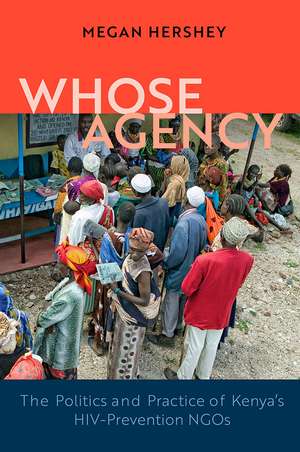Whose Agency: The Politics and Practice of Kenya's HIV-Prevention NGOs: Africa and the Diaspora: History, Politics, Culture
Autor Megan Hersheyen Limba Engleză Hardback – 3 iun 2019
Nongovernmental organizations (NGOs) are ubiquitous in the Global South. Often international in origin, many attempt to assist local efforts to improve the lives of people often living in or near poverty. Yet their external origins often cloud their ability to impact health or quality of life, regardless of whether volunteers are local or foreign.
By focusing on one particular type of NGO—those organized to help prevent the spread and transmission of HIV in Kenya—Megan Hershey interrogates the ways these organizations achieve (or fail to achieve) their planned outcomes. Along the way, she examines the slippery slope that is often used to define “success” based on meeting donor-set goals versus locally identified needs. She also explores the complex network of bureaucratic requirements at both the national and local levels that affect the delicate relationships NGOs have with the state. Drawing on extensive, original quantitative and qualitative research, Whose Agency serves as a much-needed case study for understanding the strengths and shortcomings of participatory development and community engagement.
By focusing on one particular type of NGO—those organized to help prevent the spread and transmission of HIV in Kenya—Megan Hershey interrogates the ways these organizations achieve (or fail to achieve) their planned outcomes. Along the way, she examines the slippery slope that is often used to define “success” based on meeting donor-set goals versus locally identified needs. She also explores the complex network of bureaucratic requirements at both the national and local levels that affect the delicate relationships NGOs have with the state. Drawing on extensive, original quantitative and qualitative research, Whose Agency serves as a much-needed case study for understanding the strengths and shortcomings of participatory development and community engagement.
Din seria Africa and the Diaspora: History, Politics, Culture
-
 Preț: 164.51 lei
Preț: 164.51 lei -
 Preț: 165.36 lei
Preț: 165.36 lei -
 Preț: 507.02 lei
Preț: 507.02 lei -
 Preț: 216.96 lei
Preț: 216.96 lei -
 Preț: 258.96 lei
Preț: 258.96 lei -
 Preț: 172.75 lei
Preț: 172.75 lei -
 Preț: 241.30 lei
Preț: 241.30 lei -
 Preț: 235.42 lei
Preț: 235.42 lei -
 Preț: 319.98 lei
Preț: 319.98 lei -
 Preț: 427.26 lei
Preț: 427.26 lei -
 Preț: 240.43 lei
Preț: 240.43 lei - 15%
 Preț: 476.97 lei
Preț: 476.97 lei -
 Preț: 149.90 lei
Preț: 149.90 lei - 23%
 Preț: 476.07 lei
Preț: 476.07 lei -
 Preț: 505.08 lei
Preț: 505.08 lei -
 Preț: 205.29 lei
Preț: 205.29 lei -
 Preț: 265.45 lei
Preț: 265.45 lei - 23%
 Preț: 534.68 lei
Preț: 534.68 lei - 23%
 Preț: 475.06 lei
Preț: 475.06 lei - 23%
 Preț: 475.06 lei
Preț: 475.06 lei - 23%
 Preț: 471.92 lei
Preț: 471.92 lei - 23%
 Preț: 471.33 lei
Preț: 471.33 lei - 21%
 Preț: 343.29 lei
Preț: 343.29 lei - 19%
 Preț: 440.08 lei
Preț: 440.08 lei - 8%
 Preț: 529.24 lei
Preț: 529.24 lei
Preț: 539.68 lei
Nou
Puncte Express: 810
Preț estimativ în valută:
103.27€ • 108.21$ • 85.37£
103.27€ • 108.21$ • 85.37£
Carte tipărită la comandă
Livrare economică 11-25 aprilie
Livrare express 06-12 martie pentru 52.08 lei
Preluare comenzi: 021 569.72.76
Specificații
ISBN-13: 9780299321703
ISBN-10: 0299321703
Pagini: 224
Ilustrații: 32 b-w photos
Dimensiuni: 152 x 229 x 18 mm
Greutate: 0.43 kg
Ediția:1
Editura: University of Wisconsin Press
Colecția University of Wisconsin Press
Seria Africa and the Diaspora: History, Politics, Culture
ISBN-10: 0299321703
Pagini: 224
Ilustrații: 32 b-w photos
Dimensiuni: 152 x 229 x 18 mm
Greutate: 0.43 kg
Ediția:1
Editura: University of Wisconsin Press
Colecția University of Wisconsin Press
Seria Africa and the Diaspora: History, Politics, Culture
Recenzii
“In vivid detail, Hershey provides the rare, truly nuanced view of development interventions. She argues that small, local NGOs can be successful emissaries of HIV/AIDS programming, even while they fail to achieve the true participatory development for which such NGOs are most lauded. A must-read for researchers interested in the on-the-ground politics of development program implementation.”—Jennifer Brass, Indiana University
Notă biografică
Megan Hershey is an associate professor of political science at Whitworth University.
Descriere
Drawing on deep fieldwork, this political study of HIV-prevention NGOs in Kenya serves as a much-needed case study for understanding the web of political and economic pressures local development programs must navigate—and why that matters when “success” is based on prioritizing donor-set goals over locally identified needs.
